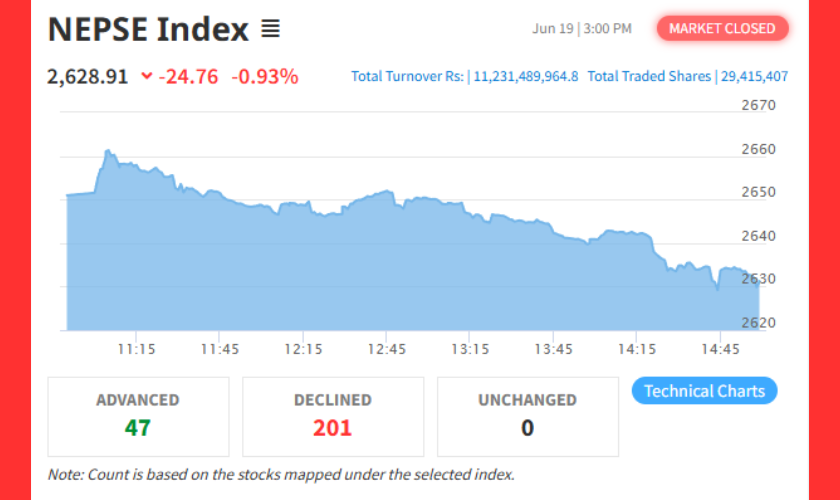The volume of Nepalis-linked funds held in Swiss banks has declined for the second consecutive year after peaking in 2022, but still remains significantly higher than pre-pandemic levels, according to data released by the Swiss National Bank (SNB) on Thursday, June 19.
As per the “Annual Banking Statistics 2024” published by Switzerland’s central bank, deposits held by Nepali individuals and entities in Swiss banks stood at 387.04 million Swiss francs (approximately Rs 65.69 billion). This marks a drop from 450.30 million francs (Rs 76.42 billion) in 2023 and a peak of 482.54 million francs (Rs 81.92 billion)—the highest figure on record–in 2022.
Historically, Swiss deposits linked to Nepal exceeded Rs 50 billion annually (based on current exchange rate) during 2015–2017, before falling to Rs 42.2 billion in 2018 and further to Rs 29.83 billion (175.87 million francs) in 2019.
The SNB data also places Nepal ahead of several South Asian countries in terms of deposits. As of 2024, funds held by Sri Lankan, Pakistani, Afghan, Maldivian, and Bhutanese nationals or entities totaled 307.1 million, 271.67 million, 3.14 million, 2.51 million, and 0.72 million francs, respectively.
India tops the region with 3.5 billion francs held in Swiss accounts, followed by a sharp rebound in Bangladeshi deposits, which jumped to 589.54 million francs in 2024 after a steep decline in the preceding two years.
According to The Daily Star , a leading Bangladeshi English daily, the surge in deposits coincided with a political upheaval in 2024, during which former Prime Minister Sheikh Hasina fled to India amid a student-led uprising. Agence France-Presse (AFP), citing the United Nations, has reported that as many as 1,400 people were killed in a government crackdown between July and August 2024 as the regime tried to retain power.
Analysts quoted in The Daily Star suggest the rise in deposits may reflect capital flight by politically connected elites seeking to safeguard assets abroad.
The Secrecy Dilemma
Due to Switzerland’s long-standing tradition of banking secrecy, the names and identities of account holders remain undisclosed. This makes it difficult to ascertain how many Nepalis have Swiss accounts or the sources of the funds.
At the same time, the secrecy has caused the Swiss banks to face allegations of being a safe haven for illicit financial flows, including proceeds from tax evasion, corruption, arms deals, and other serious crimes. Critics argue the opaque system allows funds derived from illegal activity to be shielded from scrutiny.
Illicit Outflows and Trade Misinvoicing
In Nepal’s case, observers and financial experts suspect that a significant portion of these funds may have originated from trade-related financial crimes—especially over-invoicing in import transactions using letters of credit (LCs). This technique is commonly used in trade-based money laundering to shift excess funds to offshore accounts under the guise of legitimate payments.
Since Nepali commercial banks do not typically hold foreign currency reserves in Swiss banks, experts believe that the deposits likely belong to wealthy individuals and politically connected figures. Some analysts further contend that such funds may represent kickbacks from large-scale deals or government contracts.
Not All Funds Illicit?
However, not all deposits may be illicit. An analyst, speaking to New Business Age on condition of anonymity, noted that some accounts could belong to Non-Resident Nepalis (NRNs) who have lawfully earned money abroad.
“But it’s hard to verify,” the analyst said. “Swiss banks do not disclose the identities of their clients, and while the Government of Nepal has made attempts in the past to investigate these accounts, doing so requires significant diplomatic effort and resources.”
Shift to New Havens
The recent decline in Swiss-held funds may also reflect a shift in preferences among the wealthy. Analysts suggest Nepali account holders may be increasingly turning to alternative jurisdictions such as Singapore, Ireland, and Dubai, which offer comparable levels of banking privacy with more flexible financial systems.
Despite growing global efforts to combat illicit financial flows, Nepal has yet to treat capital flight as a serious national concern. Critics argue that the lack of regulatory enforcement and political will has allowed billions to flow out of the country unchecked.
(1 Swiss francs = Rs 169.72)
Nepal – Swiss Bank Deposits in NRs Million (NPR)
|
Year |
Deposit (Million CHF) |
Deposit (Billion NRs) |
|
2015 |
314.43 |
53.346 |
|
2016 |
310.66 |
52.721 |
|
2017 |
322.88 |
54.799 |
|
2018 |
248.79 |
42.203 |
|
2019 |
175.87 |
29.835 |
|
2020 |
360.82 |
61.225 |
|
2021 |
298.00 |
50.570 |
|
2022 |
482.54 |
81.922 |
|
2023 |
450.30 |
76.417 |
|
2024 |
387.04 |
65.689 |





.jpg)






